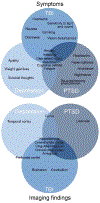Coordinating Global Multi-Site Studies of Military-Relevant Traumatic Brain Injury: Opportunities, Challenges, and Harmonization Guidelines
- PMID: 33409819
- PMCID: PMC8035292
- DOI: 10.1007/s11682-020-00423-2
Coordinating Global Multi-Site Studies of Military-Relevant Traumatic Brain Injury: Opportunities, Challenges, and Harmonization Guidelines
Abstract
Traumatic brain injury (TBI) is common among military personnel and the civilian population and is often followed by a heterogeneous array of clinical, cognitive, behavioral, mood, and neuroimaging changes. Unlike many neurological disorders that have a characteristic abnormal central neurologic area(s) of abnormality pathognomonic to the disorder, a sufficient head impact may cause focal, multifocal, diffuse or combination of injury to the brain. This inconsistent presentation makes it difficult to establish or validate biological and imaging markers that could help improve diagnostic and prognostic accuracy in this patient population. The purpose of this manuscript is to describe both the challenges and opportunities when conducting military-relevant TBI research and introduce the Enhancing NeuroImaging Genetics through Meta-Analysis (ENIGMA) Military Brain Injury working group. ENIGMA is a worldwide consortium focused on improving replicability and analytical power through data sharing and collaboration. In this paper, we discuss challenges affecting efforts to aggregate data in this patient group. In addition, we highlight how "big data" approaches might be used to understand better the role that each of these variables might play in the imaging and functional phenotypes of TBI in Service member and Veteran populations, and how data may be used to examine important military specific issues such as return to duty, the late effects of combat-related injury, and alteration of the natural aging processes.
Keywords: ENIGMA; TBI; blast injury; military; traumatic brain injury; veteran.
Conflict of interest statement
Conflicts of Interest
Dr. Adamson is on the scientific advisory board for TruGenomics, a start-up developing a biomarker for PTSD. Dr. Zafonte received royalties from 1) Oakstone for an educational CD- Physical Medicine and Rehabilitation a Comprehensive Review; 2) Demos publishing for serving as co-editor of the text
Figures
References
-
- Anda RF, Whitfield CL, Felitti VJ, Chapman D, Edwards VJ, Dube SR, Williamson DF, 2002. Adverse childhood experiences, alcoholic parents, and later risk of alcoholism and depression. Psychiatr. Serv 53, 1001–1009. - PubMed
-
- Barrett DH, Morris RD, Akhtar FZ, Michalek JE, 2001. Serum dioxin and cognitive functioning among veterans of Operation Ranch Hand. Neurotoxicology 22, 491–502. - PubMed
Publication types
MeSH terms
Grants and funding
- R01NS100973/NH/NIH HHS/United States
- I01 CX001135/CX/CSRD VA/United States
- I01 RX003443/RX/RRD VA/United States
- K99 NS096116/NS/NINDS NIH HHS/United States
- U54 EB020403/EB/NIBIB NIH HHS/United States
- R01 MH110483/MH/NIMH NIH HHS/United States
- IK2 CX001772/CX/CSRD VA/United States
- R61 NS120249/NS/NINDS NIH HHS/United States
- I01 CX001820/CX/CSRD VA/United States
- I01 RX002174/RX/RRD VA/United States
- R01 AG058822/AG/NIA NIH HHS/United States
- IK2 RX002922/RX/RRD VA/United States
- R01 NS100973/NS/NINDS NIH HHS/United States
- UL1 TR002649/TR/NCATS NIH HHS/United States
- I01 RX003442/RX/RRD VA/United States
- K99NS096116/NS/NINDS NIH HHS/United States
- UL1TR002649/NH/NIH HHS/United States
- R01AG058822/NH/NIH HHS/United States
- U54EB020403/NH/NIH HHS/United States
- R01 AG022381/AG/NIA NIH HHS/United States
- R01 AG050595/AG/NIA NIH HHS/United States
LinkOut - more resources
Full Text Sources
Other Literature Sources
Medical
Research Materials
Miscellaneous


